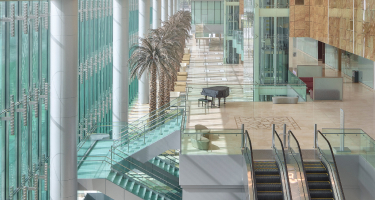Overview
SHARE
Cranial neurosurgery is a specialty involved with the surgical treatment of brain diseases and disorders. The multidisciplinary team at Cleveland Clinic Abu Dhabi’s Cranial Neurosurgery Program is experienced in a wide range of surgical approaches for patients requiring cranial neurosurgery for conditions such as brain tumors, vascular lesions, epilepsy, pain syndromes, and movement disorders.
As part of Cleveland Clinic Abu Dhabi’s Patients First approach to care, the Cranial Neurosurgery Program offers cutting-edge services that are unique in the region, including awake cranial surgery, minimally invasive craniotomies, endoscopic cranial surgery, skull base surgery, deep brain stimulation, and endovascular therapy. The most advanced technologies including navigation systems, microscopic and endoscopic equipment, hybrid angiography/operating room, electrophysiological intraoperative neuromonitoring (IOM), and fluorescence guided tumor surgeries are utilized to ensure safe and effective surgical results.
The Cranial Neurosurgery Program focuses on providing comprehensive and individualized care that is tailored to each patient's needs in order to achieve the best possible outcomes.
What We Treat
Brain tumors:
- Glial tumors (glioma, astrocytoma, glioblastoma, oligodendroglioma, ependymoma etc.)
- Metastatic tumors
- Meningiomas
- Pituitary tumors
- Schwannoma, acoustic neuroma
- Skull base tumors
Vascular lesions:
- Aneurysms
- Arteriovenous malformations (AVMs)
- Cavernous malformations (cavernoma)
- Dural arteriovenous fistulas
- Moyamoya disease
- Carotid artery stenosis
- Vertebral artery stenosis
- Venous sinus stenosis
Functional neurosurgery:
Hydrocephalus:
- Obstructive hydrocephalus
- Normal pressure hydrocephalus
- Aqueductal stenosis
Diagnosis & Treatment
SHARE
Diagnosis with Cranial Neurosurgery
Accurate diagnosis and careful pre-surgical planning are of the utmost importance for safely and effectively treating a neurosurgical disease. The expert Cranial Neurosurgery Program team utilizes the most advance diagnostic and imaging technologies including:
- Head CT scan
- Brain MRI
- MR spectroscopy
- Functional MRI
- Diffusion tensor imaging
- CSF flow studies (CINE)
- Angiography (CTA, MRA, DSA)
- Carotid ultrasound
- Transcranial doppler
- Nuclear medicine imaging (PET, SPECT, bone scan)
- Lumbar puncture (CSF analysis)
Treatment with Cranial Neurosurgery
Our Cranial Neurosurgery Program offers cutting-edge services that are unique in the region, coupled with the most advanced technologies, to ensure the safest and most effective surgical results.
- Awake cranial surgery
- Minimally invasive craniotomies
- Endoscopic cranial surgery
- Skull base surgery
- Deep brain stimulation
- Endovascular therapy
- Electrophysiological intraoperative neuromonitoring (IOM)
- Fluorescence guided tumor surgeries
Show More
Meet Our Team
SHARE
The Cranial Neurosurgery Program at Cleveland Clinic Abu Dhabi’s Neurological Institute is a multidisciplinary collaboration of highly trained medical professionals with broad expertise in planning and performing brain surgeries. We focus on providing comprehensive and individualized care that is tailored to each patient's needs to achieve the best possible outcomes.
Caregivers involved in patient care include:
- Neurosurgeons
- Ear, nose, and throat (ENT) surgeons
- Vascular surgeons
- Endocrinologist
- Ophthalmologist
- Oncologist
- Neuro-anesthesiologists
- Neuro-intensive care unit (ICU) physicians
- Psychologists
- Neuro-rehabilitation physicians
- Physical therapists
- Occupational therapists
- Speech therapists
- Social workers.

